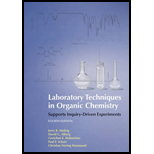
Interpretation:
The type of glassware that would be most appropriate for reaction of
Concept introduction:
Laboratory glasswares are the types of equipment that are made up of glass and are utilized for scientific work in the laboratories. The glassware is used in the laboratories because of their low coefficient of expansion and high resistance to chemical attack. Ground glass joints are one of the types of glassware utilized in laboratories to easily fit into leak-tight apparatus from commonly available parts.
Microscale and miniscale glassware are two important types of glassware used for the reaction that use a small amount of the reactants.
Explanation of Solution
The microscale glassware is the glassware used for the reactions that use very small amounts of material nearly
Therefore, the reaction of the
The reaction of
Want to see more full solutions like this?
Chapter 4 Solutions
Laboratory Techniques in Organic Chemistry